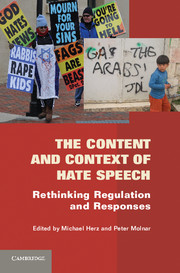Book contents
- Frontmatter
- Contents
- Contributors
- Foreword: Hate Speech and the Coming Death of the International Standard before It Was Born (Complaints of a Watchdog)
- Foreword: Hate Speech and Common Sense
- Acknowledgments
- Introduction
- Part I Overviews
- 1 Interview with Robert Post
- 2 Is There a Case for Banning Hate Speech?
- 3 Hate Speech
- 4 Interview with Kenan Malik
- 5 Hate Speech and the Demos
- 6 On American Hate Speech Law
- Part II Refinements and Distinctions
- Part III Equality and Fear
- Part IV International Law
- Index
- References
3 - Hate Speech
Published online by Cambridge University Press: 05 June 2012
- Frontmatter
- Contents
- Contributors
- Foreword: Hate Speech and the Coming Death of the International Standard before It Was Born (Complaints of a Watchdog)
- Foreword: Hate Speech and Common Sense
- Acknowledgments
- Introduction
- Part I Overviews
- 1 Interview with Robert Post
- 2 Is There a Case for Banning Hate Speech?
- 3 Hate Speech
- 4 Interview with Kenan Malik
- 5 Hate Speech and the Demos
- 6 On American Hate Speech Law
- Part II Refinements and Distinctions
- Part III Equality and Fear
- Part IV International Law
- Index
- References
Summary
Given the evils of hate, any argument for protecting hate speech is, at best, an uphill effort and, at worst, simply misguided. Many people either accept, or at least wonder whether they should accept, an argument that goes something like this:
Anyone sensitive to the horror of genocide knows that hate pervades the atmosphere at such times. Few goals can rank higher than preventing genocide and the murderous racial conflicts presented to the world during the twentieth century. Lesser instances of race-based violence also should be prevented. It is difficult to find any value in the freedom to engage in racist hate speech. Important but ultimately less significant values such as free speech cannot, for any sensitive person, lead to any pause in outlawing the speech that contributes to these horrors. Exceptions to any free speech principle should be made for hate speech. Whether or not the ban will be effective in even a few cases to prevent genocide or racial violence, the mere possibility that it will more than justifies the ban.
As an advocate of almost absolute protection of free speech, I should explain the grounds for my valuation of free speech and rejection of the just mentioned claim. That explanation, it turns out, is too ambitious for this essay. Nevertheless, Section II of this chapter describes but does not defend a theory of why racist or hate speech should be protected – a theory that I believe provides the best, albeit often unrecognized, explanation of existing American case law but one that is surely a controversial, probably minority, view even in the United States. There are, of course, arguments that emphasize different evils about hate speech, evils presumably less dramatic but more common than those just mentioned, about the harms caused by hate speech. Although these will mostly not be discussed here, my expectation is that the arguments for and against prohibitions discussed here will, with variable force, also apply to those arguments – and I will occasionally note how a focus on these rationales could weaken or strengthen arguments against regulation.
- Type
- Chapter
- Information
- The Content and Context of Hate SpeechRethinking Regulation and Responses, pp. 57 - 80Publisher: Cambridge University PressPrint publication year: 2012
References
- 15
- Cited by



